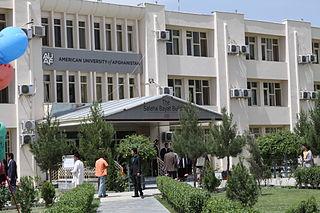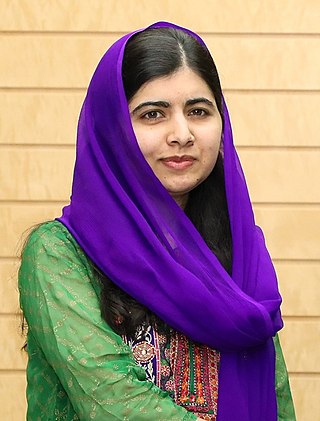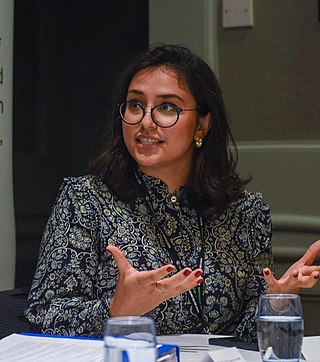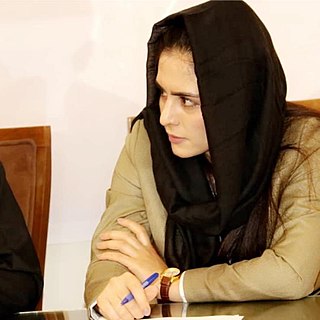Related Research Articles

Afghanistan, officially the Islamic Emirate of Afghanistan, is a landlocked country located at the crossroads of Central Asia and South Asia. Referred to as the Heart of Asia, it is bordered by Pakistan to the east and south, Iran to the west, Turkmenistan to the northwest, Uzbekistan to the north, Tajikistan to the northeast, and China to the northeast and east. Occupying 652,864 square kilometers (252,072 sq mi) of land, the country is predominantly mountainous with plains in the north and the southwest, which are separated by the Hindu Kush mountain range. Kabul is the country's largest city and serves as its capital. As of 2021, Afghanistan's population is 40.2 million.

The treatment of women by the Taliban refers to actions and policies by various Taliban regimes which are either specific or highly commented upon, mostly due to discrimination, since they first took control in 1996. During their first rule of Afghanistan (1996–2001), the Taliban were notorious internationally for their misogyny and violence against women. In 1996, women were mandated to wear the burqa at all times in public. In a systematic segregation sometimes referred to as gender apartheid, women were not allowed to work, nor were they allowed to be educated after the age of eight. Women seeking an education were forced to attend underground schools, where they and their teachers risked execution if caught. They were not allowed to be treated by male doctors unless accompanied by a male chaperone, which led to illnesses remaining untreated. They faced public flogging and execution for violations of the Taliban's laws.

xDr. Massouda Jalal is the first woman in the history of Afghanistan who ran for the Office of the President of Afghanistan in 2002, and again in 2004. She holds the distinction of being the first woman to compete for presidency in Afghanistan, a highly conservative society where women's engagement in public life was considered improper, unacceptable, and previously banned. Dr. Jalal emerged as a leading voice of Afghan women in 2001 after her election as the Representative to the 2002 Loya Jirga. While serving her term, she became one of the frontrunners for the position of Interim President, opposite to ex-president Hamid Karzai.

At Five in the Afternoon is a 2003 film by Iranian writer-director Samira Makhmalbaf. It tells the story of an ambitious young woman trying to gain an education in Afghanistan after the defeat of the Taliban. The title comes from a Federico García Lorca poem and is a tale of flourishing against the odds.

Afghan refugees are citizens of Afghanistan who were forced to flee their country as a result of wars, persecution, torture or genocide. The 1978 Saur Revolution followed by the 1979 Soviet invasion marked the first major wave of internal displacement and international migration to neighboring Iran and Pakistan; smaller numbers also went to India or to countries of the former Soviet Union. Between 1979 and 1992, more than 20% of Afghanistan's population fled the country as refugees. Following the Soviet withdrawal in 1989, many returned to Afghanistan, however many Afghans were again forced to flee during the civil war in the 90s. Over 6 million Afghan refugees were residing in Iran and Pakistan by 2000. Most refugees returned to Afghanistan following the 2001 United States invasion and overthrow of the Taliban regime. Between 2002 and 2012, 5.7 million refugees returned to Afghanistan, increasing the country's population by 25%.

Education in Afghanistan includes K–12 and higher education, which is under the Ministry of Education and Ministry of Higher Education. In 2021, there were nearly 10 million students and 220,000 teachers in Afghanistan. The nation still requires more schools and teachers. Soon after the Taliban takeover of the country in August 2021, they banned girls from secondary education. Some provinces still allow secondary education for girls despite the ban. In December 2022, the Taliban government also prohibited university education for females in Afghanistan, sparking protests and international condemnation.

Women's rights in Afghanistan have oscillated back and forth depending on the time period as well as the regime in power. After King Amanullah Khan's attempts to modernize the country in the 1920s, women officially gained equality under the 1964 Constitution. However, these rights were taken away in the 1990s through different temporary rulers such as the mujahideen and the Taliban during the Afghan civil war. During the first Taliban regime (1996–2001), women had very little to no freedom, specifically in terms of civil liberties. When the Taliban was overthrown by the United States following the 9/11 attacks, women's rights gradually improved under the presidential Islamic Republic of Afghanistan. Women were de jure equal to men under the 2004 Constitution.

Malala Yousafzai is a Pakistani female education activist and the 2014 Nobel Peace Prize laureate at the age of 17. She is the world's youngest Nobel Prize laureate, the second Pakistani and the first Pashtun to receive a Nobel Prize. Yousafzai is a human rights advocate for the education of women and children in her native homeland, Swat, where the Pakistani Taliban had at times banned girls from attending school. Her advocacy has grown into an international movement, and according to former Prime Minister Shahid Khaqan Abbasi, she has become Pakistan's "most prominent citizen."

Roya Rahmani is an Afghan diplomat who served as Afghanistan's first female ambassador to the United States and non-resident ambassador to Mexico, Argentina, Colombia, and the Dominican Republic from December 2018 to July 2021. She is currently the Chair of the international advisory company in development finance — Delphos International LTD. She is also a distinguished fellow at the Georgetown Institute for Women, Peace, and Security, a senior advisor at the Atlantic Council's South Asia Center, and a senior fellow for international security at the New America Foundation. From 2016 to 2018, she served as Afghanistan's first female ambassador to Indonesia, first ever ambassador to the Association of Southeast Asian Nations, and non-resident ambassador to Singapore.

Shabnam Nasimi is an Afghan-born British social activist, commentator, and political figure. She was formerly policy advisor to Minister for Afghan Resettlement Victoria Atkins MP and Minister for Refugees Richard Harrington. A member of the Conservative Party, Nasimi was a candidate in the 2021 local elections.
Sam Mort is currently Chief of Communication, Advocacy and Civic Engagement for UNICEF Afghanistan, based in Kabul. Officially based in New York, she is currently 'one of the few Westerners left' after evacuations from Kabul. Afghanistan is in the midst of a Taliban offensive, where the insurgents have now taken over from the elected government. She previously announced that Unicef had made a historic deal to have girls educated in the Taliban-controlled areas of the country in 2020.
Rangina Hamidi is an Afghan-American writer, educator, social activist, and politician. She is well known as an advocate for women's rights in Afghanistan and has engaged in various social projects to empower girls and women in Afghanistan. Hamidi has served as an education minister of Afghanistan, until the Taliban takeover. She was the first female education minister of Afghanistan. During the Afghanistan being taken over by the Taliban, she vowed to stay in Afghanistan and continue her humanitarian efforts by actively involving in empowerment of Afghan women. However, after several weeks, she fled with her family to Arizona.
Protests in Afghanistan against the Taliban started on 17 August 2021 following the Fall of Kabul to the Taliban. These protests are held by Islamic democrats and feminists. Both groups are against the treatment of women by the Taliban government, considering it as discriminatory and misogynistic. Supported by the National Resistance Front of Afghanistan, the protesters also demand decentralization, multiculturalism, social justice, work, education, and food. There have been pro-Taliban counterprotests.
On 15 August 2021, the city of Kabul, the capital of the Islamic Republic of Afghanistan, was captured by Taliban forces during the 2021 Taliban offensive, concluding the War in Afghanistan that began in 2001. The fall of Kabul provoked a range of reactions across the globe, including debates on whether to recognize the Taliban as the government of Afghanistan, on the humanitarian situation in the country, on the outcome of the War, and the role of military interventionism in world affairs.

Crystal Bayat is an Afghan social activist and human rights advocate known for her protests against the Taliban takeover, advocacy for women rights and political activism inside and outside Afghanistan. A native of the Ghazni province, Shia (coming from the Bayat family, a Turkic ethnicity minority. Bayat was born in 1997 in Kabul. She grew up most of her life with democracy and positive societal changes. She is currently continuing the fight to preserve Afghan human right's achievements as an agent of change.
The politics of Afghanistan are based on a totalitarian emirate within the Islamic theocracy in which the Taliban Movement holds a monopoly on power. Dissent is not permitted, and politics are mostly limited to internal Taliban policy debates and power struggles. As the government is provisional, there is no constitution or other basis for the rule of law. The structure is autocratic, with all power concentrated in the hands of the supreme leader and his clerical advisors.
Zahra Joya is an Afghan journalist. She is the founder of Rukhshana Media, an outlet in Persian and English which she runs from exile.

Fatima Payman is an Afghan-born Australian politician and Senator of the Australian Senate after the 2022 Australian federal election. A member of the Labor Party, she was declared elected to the Senate for Western Australia on 20 June 2022 and began her term on 1 July. She became the Australian Parliament's first hijab-wearing Muslim woman.
The 20-year-long War in Afghanistan had a number of significant impacts on Afghan society.
Razia Barakzai is an Afghan women's rights activist. She was named one of the BBC's 100 Women in 2021 for her work in leading the first women's protests against the Taliban in August 2021, following their takeover of Afghanistan that same month.
References
- 1 2 3 Idaszak, Josh (Spring 2022). "In Exile, but Undaunted". Wellesley Magazine. Retrieved 2023-09-20.
- 1 2 3 4 5 "Pashtana's Diary". LEARN. Retrieved 2023-09-20.
- ↑ "My Organization Empowers Girls Through Education — By Running Underground Schools in Afghanistan". Global Citizen. 2023-02-07. Retrieved 2023-09-20.
- 1 2 3 4 5 6 Kumar, Ruchi (2023-03-09). "The Afghan woman running covert schools under the Taliban's nose". The National. Retrieved 2023-09-20.
- ↑ "2022 Summit". Young Activists Summit. 2022-09-12. Retrieved 2023-09-20.
- 1 2 3 4 "This Afghan Activist Is Fighting for Girls' Education Despite Living in Exile". Global Citizen. 2023-06-07. Retrieved 2023-09-20.
- ↑ "LAST TO EAT, LAST TO LEARN". Kirkus Reviews. March 3, 2023. Retrieved September 20, 2023.
- ↑ Abé, Nicola (2022-03-28). "Afghanistan und Bildung: »Es ist unwürdig, dass diese Mädchen weinen müssen, damit die Welt hinsieht«". Der Spiegel (in German). ISSN 2195-1349 . Retrieved 2023-09-20.